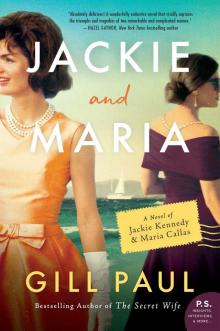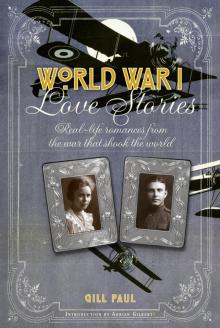Jackie and Maria Read online
Page 5
Was it his age that made him less appassionato? Did he have trouble getting aroused? She rarely felt any hint of an erection. Was it because they lived and worked together around the clock, so there was no mystique? He saw her shaving her legs; did that dampen his desire? Even if he wasn’t attracted to her, could he not make the effort when he knew how much she wanted a child?
A realization hit her, with the undeniable force of truth: He doesn’t notice me anymore. I might as well not be here. She felt like crying once the words had formed in her head. She would never admit this to anyone, not even her closest friends, such as Biki, the Milanese designer, and Mary Carter, a dynamic socialite who lived in Dallas.
Stop it, Maria, she rebuked herself a moment later. He is your husband, your beloved. You are not in an opera now. This is what a real marriage is like. Pull yourself together and get on with it.
She leaned over and kissed his brow, trying to feel tenderness toward him. He didn’t stir.
Chapter 9
New York City
November 1957
Jackie watched her one-hour-old daughter lying in a crib by her hospital bed, filled to the brim with wonder. The baby had been sleeping, making little snuffly noises, but suddenly she awoke with an involuntary jerk and began to mewl. A nurse appeared, picked her up, and settled her in Jackie’s arms.
The little girl had a fine sprinkling of reddish-blond hair, like thistledown. Her nails were tiny perfect ovals. The eyes were screwed tight against the harsh hospital lights, and the toothless mouth made strange shapes, as if she were trying to talk but couldn’t figure out how.
Who are you? Jackie wondered. Who will you become?
This child would never know how precious she was. Third time lucky indeed! But her arrival was also tinged with sadness because Jackie’s father, Black Jack, had not lived to meet her.
He had been diagnosed with liver cancer—the drinker’s cancer, everyone said—earlier in the year, but no one had predicted the speed of his decline. Jackie had visited him in the hospital at the end of July and had been shocked to see that the whites of his eyes were a garish yellow. At least his spirit seemed as strong as ever.
“I’ll be home in a week or so, they tell me,” he said. “Not a moment too soon. These nurses have no sense of humor.” He glared at the one within earshot, who was marking something on a chart.
“Mr. Bouvier,” she said, “we nurses have a right to go about our jobs without the patients manhandling us.”
“It was only a kiss,” he pleaded, winking at Jackie.
“Oh, Daddy!” she rebuked. “You can’t go around kissing nurses. Act your age.”
He’d seemed so much himself that afternoon she decided to fly back to Virginia, where she could relax in the relative cool of the countryside. She wasn’t riding during this pregnancy—she was taking no chances this time—but it was always soothing to spend time with the horses at her stepfather’s stables.
Then a call came on the evening of August 2 to say Black Jack had taken a turn for the worse. Jack drove her to New York first thing the next morning, her chest tight with dread. Hang on, Daddy. I can’t lose you, I just can’t, she repeated over and over in her head, fighting off the panic that threatened to take hold.
When they reached the hospital ward, the matron intercepted them. “I’m so sorry, Mr. and Mrs. Kennedy, but he’s gone. It was peaceful at the end.”
I don’t believe you, Jackie thought. Black Jack would never have gone peacefully. But the nurse who had sat with him as he passed confirmed that he had been told Jackie was on her way, whereupon he closed his eyes, seeming content, and never awoke again.
Jack put his arms around her but she didn’t want to give in to grief. Not in a hospital. There were things to do, arrangements to be made.
After collecting the few belongings he’d had with him, they went to her daddy’s tiny apartment on East Seventy-Fourth Street to await Lee, who was flying in from London. The drapes were closed and the temperature was as hot as an oven, with dust motes dancing and an irritable bluebottle buzzing. She lit a cigarette and wandered around, numb with grief, unable even to cry. Jack started exploring what was left of a man’s life: some clothes, a few sticks of furniture, a couple of shelves of books, and a stack of 78-rpm jazz records. “I didn’t know he was such a jazz hound,” he said, flicking through the sleeves.
You hardly knew him, Jackie mused. A few alcohol-fueled dinners don’t make a close friendship.
On the dresser there were several framed photos. In pride of place was one of her, aged nine or ten, holding up a gymkhana trophy. There were photos of her and Lee with their mother, then one of Jackie walking precariously atop a stone wall that was far too high. Her daddy always let her take risks, confident she would land on her feet.
The tears came suddenly as she realized she had lost the person who loved her most in the world. There had never been any question that she was her daddy’s favorite; he used to tell her as much in front of Lee. It must have been hard for her, growing up with that knowledge. Jackie was the one who did best academically; she was the athletic daughter, who won prizes and commendations; the one who resembled him most. Lee had been more beautiful as a girl, and she got to be her mother’s favorite, but Black Jack was the exciting parent, the one they both wanted to impress.
The result of his favoritism had been Lee’s fierce competitiveness, although she was four years younger than Jackie and it was natural that she would not have achieved the same milestones. During one summer vacation she practiced the piano relentlessly, staying indoors day after day, so that she would outshine Jackie at the school recital in the fall. On the night of Jackie’s coming-out party, Lee tried to upstage her by sauntering out in an off-the-shoulder, skin-tight pink gown, a tart’s gown. She was only thirteen and got a mighty telling off from their mother, but she grabbed the attention, just for that fleeting moment.
Lee was determined to be the one to marry first, so she wed her teenage sweetheart, publisher Michael Canfield, while Jackie was still trying to nudge Jack Kennedy toward the altar. Lee and Michael moved to London, where she began attending the Paris shows, befriending the designers, and boasting to Jackie of new acquisitions. She wouldn’t dream of being seen in last season’s colors or hemlines; Lee was always au courant. It sometimes felt as if she had an imaginary scorecard and was trying to prove that she was just as good as, if not better than, her sister.
When she arrived later that afternoon, Lee’s eye makeup was smudged, her hair tousled, and her cream Balmain suit creased, with what looked like a red wine stain on the lapel. Jackie wondered if she had been drinking on the plane. It wasn’t like her to be less than impeccably turned out.
They all hugged, then Lee began to sob: “I can’t believe he’s gone. What will we do? How will we manage without him?”
Jackie stroked her hair, feeling a surge of tenderness. “You’ve got me,” she said. “I’m not going anywhere.”
She had always been the stronger of the two; Lee could fall apart, but she would cope.
OVER THE NEXT few weeks, while Lee often collapsed in bouts of noisy sobbing, Jackie’s sorrow came and went from one day to the next, sparked by the tiniest things. The scent of Wildroot hair tonic. Plus fours worn with two-tone shoes. The racing reports in the newspaper. She missed that feeling of being understood without having to say a word. She and Lee had it sometimes, a legacy of their shared childhood, but with Black Jack she used to be able to communicate her opinion with an arch of the eyebrow, and be rewarded with his grin.
And now, just over three months later, Black Jack’s first granddaughter was lying in her arms. The little girl opened her eyes and looked directly at Jackie, a gaze that startled her because it seemed so knowing. She got the strangest tingling feeling that her daddy was looking back at her. The resemblance was striking.
The door burst open and Jack hurried in.
“Are you alright, honey? Is this her? Oh, my . . .” He gasped as their daug
hter turned her head in the direction of his voice, cross-eyed, unfocused now.
“Do you want to hold her?” Jackie asked.
He took a step back. “She’s so tiny. What if I drop her?”
She laughed. “You must have held your younger brothers and sisters. Come here. Like this.”
She took his hand, pulled his arm into the correct position, then passed the baby to him, sliding her own hand clear so the fuzzy head rested on his palm.
“I wish I had a camera.” She laughed. “The look of terror on your face is priceless. You saved the crew of a PT boat from shark-infested waters during the war, and you lambast Republicans in the House, yet you are petrified of a creature who weighs six and a half pounds.”
He gave a sheepish grin, and she thought she had never loved him as much as she did at that precise moment.
Chapter 10
Milan
September 1958
Who was that on the phone?” Maria called over the banister to the hallway two floors below. The dogs had been barking, so she couldn’t hear.
“Aristotle Onassis,” Battista called back. “He’s in Milan next week and wanted to invite us for dinner, but I told him we’ll be in America.”
“What a shame! That’s the third time he’s asked and we haven’t been free. He’ll think we’re giving him the brush-off.” She was annoyed she hadn’t gotten to the phone first. It would have been fun to chat with him.
“I’ve invited him to the gala concert in Paris in December.”
Maria couldn’t think that far ahead. She had so many engagements stacked up for the next three months that she felt exhausted just thinking about them: London first, then fourteen concerts in cities across the States and Canada during October and November. To her huge relief, there had been no shortage of offers to fill the gap left by the end of her contract with La Scala, including a long-term commitment to the Met in New York. She had worried that her career might be on the rocks, so it was wonderful to find herself still in demand. But she missed being part of a company, and she was sick to the back teeth of airport departure lounges and anonymous hotel rooms.
That afternoon she was busy helping her maid Bruna pack. It was difficult to plan her wardrobe in the fall because the weather could be so variable, from one extreme to another. At least they had a week in Dallas. Maria had loved Dallas ever since she had first been invited to sing there. The climate in November would be warmer than Milan, she liked the opera house, the hospitality was lavish, and she had good friends in town. One in particular. That part of the tour would be a welcome respite.
“MARIA! OVER HERE!”
Her friend Mary Carter was running across the tarmac, skirts flying, as Maria descended the steps of the plane at Dallas’s Love Field airport. No one tried to stop Mary; she was statuesque, with an air of authority and a frank, no-nonsense way of speaking that got her backstage at any concert and ushered to the best seat in every restaurant.
“Maria Segunda!” This was the nickname Mary had been given by their Dallas friends because of the similarities between the two women: both tall, both dark, both larger-than-life characters. Maria flung her arms around Mary’s waist and squeezed tight. “I’ve missed you so much!” It was true. Mary was one of the few people with whom she could be entirely herself.
Mary pulled back. “You look tired, honey. You’re coming to my place for dinner tonight. Put your feet up and let me give you a good ol’ southern welcome.”
“So long as you’re not serving grits, like last time,” Maria retorted. “Foul, slimy stuff.”
“Gotcha, loud and clear,” Mary replied. “No grits.”
Battista looked on, no idea what they were talking about. His English had not improved.
Mary’s ranch house was a proper home, with couches you sank into, an outdoor dining area surrounded by sycamore trees strung with colored lanterns, and hammocks swinging between the trunks. Maria slipped off her shoes and walked barefoot on the grass, inhaling the scents of honeysuckle and home cooking.
Mary served a heaping platter of fried chicken that they ate with greasy fingers, along with freshly baked cornbread and a bowl of collard greens. There was a pitcher of Maria’s favorite root beer for the women, while Battista and Mary’s husband, Jack, had bottles of Dixie beer.
After eating, the women went for a stroll around the garden and stopped at a pergola shrouded in bougainvillea with a bench underneath.
“How come you’re looking so pinched, gal?” Mary asked, touching her cheek. “You haven’t been dieting again, have you? There’s not a scrap of flesh on you. Sit down and tell me what’s going on in your life.”
THE WOMEN HAD met only the previous year, after a concert Maria gave in Dallas, but right from the get-go it felt as if they had known each other forever. Mary had bypassed the usual social niceties and dived straight in, asking Maria how she had achieved her famous weight loss back in 1954. The papers had reported all kinds of weird and wonderful stories, from tapeworms to spaghetti diets.
“If there’s a secret miracle, you need to share it with me,” Mary said, slapping her well-padded haunches. “I’m getting married in a couple of months and can’t fit the dress, which is a family heirloom I simply have to wear.”
Maria was disarmed by her frankness and gave an honest answer. “I’m afraid the truth is boring. I cut out all the foods that made me fat in the first place: pasta, pizza, doughnuts, and ice cream . . . basically, I lived on steak and salad for fourteen months.”
Mary shuddered. “Weren’t you permanently starving? I’d get so hungry, I’d eat my own arm.”
Maria thought back. “I had good reasons to lose weight: my size was limiting the roles I could play. No one was going to ask me to sing Cio-Cio-san in Madama Butterfly. Can you imagine? A two-hundred-pound Heffalump thundering across the stage, pretending to be the fifteen-year-old Japanese beauty?”
“But you must have extraordinary willpower. I start diets all the time and last a day if I’m lucky. Usually much less.”
“I do have willpower,” Maria agreed. “I just had to channel it.”
She didn’t tell Mary that a fertility expert had suggested weight loss might help her get pregnant. That was the greatest motivation of all. She had set herself a goal, visualized the sylphlike shape she wanted, and not stopped till she got there. Every week she measured her hips, thighs, waist, and bust, noting the shrinking measurements, watching a new shape emerge as her excess flesh evaporated.
“I was unhappy being big,” she continued. “I started overeating as a miserable teenager and it got out of hand. But you shouldn’t diet. Being curvy suits you. Get a wedding dress you feel comfortable in and help yourself to a big slice of wedding cake. Eat some for me!”
AS THEY SAT under the pergola, Maria wondered how to answer Mary’s question about her life. She didn’t often have time to reflect.
“It’s been a tough year,” she began. “Trouble with contracts, trouble with the press. Leaving La Scala was horrible. I’ve got a headache that never seems to go away and my doctor says it’s caused by tension, and that I also have low blood pressure. But still the commitments pile up. The Met in New York got me to agree to a whole string of concerts and it seems there’s no letup in sight.”
“Why doesn’t Battista tell the Met to go jump?”
“I’m under contract, so I’m trapped. I just need to find the energy to get through the winter.”
Mary took her hand and squeezed it firmly. “You’re taking on too much. Promise me you won’t sign any more contracts till you’ve had a good long rest!”
Maria sighed. “We had two months at Lake Garda in the summer, but they sped past and now it’s hectic again. Anyway . . .” She shook herself. “Enough about me! Tell me your news. How’s Dallas? How many social committees are you bossing around this fall?”
Mary had a soft light in her eyes as she answered. “I’ve cut back on the committees but I do have some news. It seems I’ve got a little one
on the way . . .” She patted her stomach.
“You’re pregnant!” Maria tried to force her lips into a smile but couldn’t manage it. Instead, to her horror, tears welled up. She blinked hard and covered her eyes with her fingertips, but emotion got the better of her and a sob slipped out.
“What’s wrong? I didn’t mean to upset you.”
Maria struggled for control, ashamed of her outburst. “It’s magnifico. I’m happy for you, I really am.”
Mary produced a handkerchief from the pocket of her flared skirt. “I believe you . . . although you’ve got a funny way of showing it.” She chuckled. “The baby won’t change anything between us, you know. We’ll have help, so I can still fly across to visit.”
“It’s not that,” Maria stuttered, dabbing at her eyes. “It’s just . . . I wish with all my heart I could be pregnant too. I’ve wanted a baby for as long as I can remember.”
“Make Battista give you one!” Mary chided. “It’s his duty.”
“It’s not that simple,” Maria told her, and the story poured out about the specialist telling her she had a malformed uterus and her husband’s waning sexual interest. “I bet Elizabeth Taylor doesn’t have trouble getting men to perform in bed,” she finished.
“I bet that woman has a whole heap of trouble with her men,” Mary retorted. “But why didn’t you tell me you wanted a baby? I’d have been more tactful about breaking my news if I’d known.”
Maria laid her head on Mary’s shoulder and looped an arm around her waist. “I sometimes get the strangest sensation that my child is out there waiting to be born. I’m sure she’s a girl. If only I could figure out how to make her come to me.” She began to cry, softly.
Mary held her close. “It’ll be alright,” she murmured, stroking her hair. “I’m sure she’ll come. I know she will.”

 The Collector's Daughter
The Collector's Daughter The Lost Daughter
The Lost Daughter Jackie and Maria
Jackie and Maria The Affair
The Affair Love...Maybe
Love...Maybe The Secret Wife
The Secret Wife No Place For a Lady
No Place For a Lady Another Woman’s Husband
Another Woman’s Husband World War I Love Stories
World War I Love Stories World War II Love Stories
World War II Love Stories